| Srl | Item |
| 1 |
ID:
109542
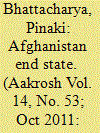

|
|
|
| 2 |
ID:
086163


|
|
|
|
|
| Publication |
2009.
|
| Summary/Abstract |
President-elect Barack Obama's announcement that closing the US detention facility at Guantanamo Bay, Cuba, would be among his priorities has raised hopes among Europeans. Reform of the detention system may be perceived as a first step towards the renewal of closer transatlantic ties, in line with the wider expectations of European governments and domestic publics towards the new US administration. Apart from the symbolic value, reform of US detention policy would also have the practical benefit of facilitating transatlantic cooperation in areas where it is most crucial: intelligence-sharing, transnational law enforcement and the conduct of multinational military operations.
European governments will also need to rethink their own approach to detention. Their reaction to US detention policies has encompassed both critical rhetoric and tacit acceptance (and sometimes assistance). These European governments have, however, not done enough to face up to the problem themselves.
|
|
|
|
|
|
|
|
|
|
|
|
|
|
|
|
| 3 |
ID:
090183
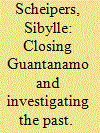

|
|
|
|
|
| Publication |
20009.
|
| Summary/Abstract |
Closing Guantanamo confronts the United States and the West more generally with two different but interrelated tasks. The first is facing up to the past detention policy: how could it happen that the prohibition against torture, which both academics and policymakers regarded as a strong and consolidated norm in international relations, yielded under the weight of the shock and fear caused by the events of 11 September 2001.
|
|
|
|
|
|
|
|
|
|
|
|
|
|
|
|
| 4 |
ID:
090178
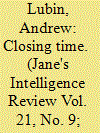

|
|
|
|
|
| Publication |
2009.
|
| Summary/Abstract |
In January, incoming US President Barack Obama announced that the controversial Guantanamo Bay detention facility would be closed by January 2010. Eight months later, the exit strategy appears to have shifted, with Jeh Johnson,a lawyer at the Department of Defense, telling a Senate committee on 10 July that some detainees could be held indefinitely.
|
|
|
|
|
|
|
|
|
|
|
|
|
|
|
|
| 5 |
ID:
096706
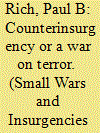

|
|
|
| 6 |
ID:
090180
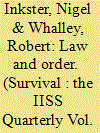

|
|
|
|
|
| Publication |
2009.
|
| Summary/Abstract |
The reluctance of European countries to assist the US government with the closure of the Guantanamo Bay detention facility by accepting some of the remaining 240 inmates risks being seen in the United States either as an exercise in European Schadenfreude (the Americans created this mess and it now behoves them to fix it); or as another classic example of European readiness to shelter beneath a US security umbrella without themselves being willing to do any of the dirty work needed to ensure their own safety. But the reality is that for all EU states, a decision to accept Guantanamo detainees means confronting a complex array of operational, legal and political issues which collectively will prove hard to resolve.
|
|
|
|
|
|
|
|
|
|
|
|
|
|
|
|
| 7 |
ID:
081991
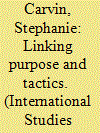

|
|
|
|
|
| Publication |
2008.
|
| Summary/Abstract |
The critique of the laws of war (and international law in general) coming out of America as the war on terror began seemed to have emerged as a response to the horror of 9/11 and the belief that the United States was now engaged in a "new paradigm" of warfare. However, the Bush administration's argument needs to be situated in a wider historical context. The source of the arguments against applying the Geneva Conventions to the prisoners caught in Afghanistan emerged well before 9/11 and can be traced to the end of the Cold War. These doctrines emerged out of the work of the "new sovereigntists" and out of the frustrations guided by coalition warfare. This paper seeks to trace the origin of these arguments which challenge the traditional division between jus ad bellum (the law governing the resort to force) and jus in bello (the law governing tactics in warfare).
|
|
|
|
|
|
|
|
|
|
|
|
|
|
|
|
| 8 |
ID:
092993
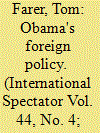

|
|
|
|
|
| Publication |
2009.
|
| Summary/Abstract |
Barack Obama's first year should appear disappointing only to persons blind to the constraints imposed by the Bush legacy, the still reeling world economy, an intimidating agenda of domestic problems, a polarised domestic politics, and at least temporarily intractable opponents of the President's undoubted ambitions to tame the Middle East and promote cooperation among the leading states without jettisoning a commitment to liberal values. By ordering an end to torture and moving to close Guantanamo, he has signalled the restoration of moral restraint on the exercise of American power and implicitly expressed belief in the efficacy of soft power assets. Additionally, he has attempted to create political space for change by pushing the conventional limits of American presidential discourse. A decent start, but the hard part lies ahead.
|
|
|
|
|
|
|
|
|
|
|
|
|
|
|
|
| 9 |
ID:
088136
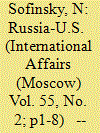

|
|
|
|
|
| Publication |
2009.
|
| Summary/Abstract |
"THE STATUE OF LIBERTY as a symbol for America was replaced with Guantanamo" - this is how Zbigniew Brzezinski described his country in a recent interview with the Der Spiegel magazine. The former U.S. presidential national security advisor, now a respectable political expert and foreign policy consultant for the B. Obama administration, made such a grim assessment of the eight-year performance by George W. Bush, the 43rd U.S. president.
Which of this is reality and which is rhetoric is a question that has yet to be answered. Wide-ranging, harsh criticism along many lines should be expected to continue. Positive shifts should be expected to become somewhat more pronounced. The "pro" and "con" arguments will take final shape. Without laying claim to an exhaustive analysis, I would like to offer some personal judgments on this score in so far as concerns Russia and Russian-U.S. relations in the foreseeable future.
George W. Bush's two presidential terms coincided with a period of development that was very special to us. Without repeating some well-known truisms, I would like to reiterate that it was a period of stabilization, a period of political, economic and intellectual "straightening out," or "concentration" according to Gorchakov, which our country went through after the critical period of the turmoil and upheavals of the 1990s. We returned into the world's top 10 economies, acquiring quite an impressive, international political weight, although not regaining our former weight, and finally, proceeding with our creative internal reform.
|
|
|
|
|
|
|
|
|
|
|
|
|
|
|
|